
28/Female/Earthling- An amateur naturalist and geology major living in the Missouri Ozarks. Botany 🌿, mycology 🍄, geology 🏔️, foraging 🍓, gardening and more! 🌼🐦🦉🐝 😀 (Natural sciences are my niche.) •iNaturalist ID: oliviarosaline •Rockd Macrostrat Lab: Olivia Myers
86 posts
Ruby Dapperling

Ruby Dapperling
Leucoagaricus rubrotinctus


Aug. 14th, 2023
St. Louis County, Missouri, USA
Olivia R. Myers
@oliviarosaline
-
 evan-vamp-hiphopswag liked this · 1 year ago
evan-vamp-hiphopswag liked this · 1 year ago -
 silverxxs-world liked this · 1 year ago
silverxxs-world liked this · 1 year ago -
 samkee00 liked this · 1 year ago
samkee00 liked this · 1 year ago -
 drhoz reblogged this · 1 year ago
drhoz reblogged this · 1 year ago -
 drhoz liked this · 1 year ago
drhoz liked this · 1 year ago -
 sohologrambouquet liked this · 1 year ago
sohologrambouquet liked this · 1 year ago -
 thelostcanyon liked this · 1 year ago
thelostcanyon liked this · 1 year ago -
 sarasakysunmoon liked this · 1 year ago
sarasakysunmoon liked this · 1 year ago -
 adrar-amellal24 liked this · 1 year ago
adrar-amellal24 liked this · 1 year ago -
 royalnessmale liked this · 1 year ago
royalnessmale liked this · 1 year ago -
 dictamo liked this · 1 year ago
dictamo liked this · 1 year ago -
 balance0101 liked this · 1 year ago
balance0101 liked this · 1 year ago -
 witchofthedirt reblogged this · 1 year ago
witchofthedirt reblogged this · 1 year ago -
 bruises-am3thyst liked this · 1 year ago
bruises-am3thyst liked this · 1 year ago -
 firagasoap liked this · 1 year ago
firagasoap liked this · 1 year ago -
 moe-mycelium liked this · 1 year ago
moe-mycelium liked this · 1 year ago -
 yesyoubelonghere liked this · 1 year ago
yesyoubelonghere liked this · 1 year ago -
 erieforage liked this · 1 year ago
erieforage liked this · 1 year ago -
 witchofthedirt liked this · 1 year ago
witchofthedirt liked this · 1 year ago -
 cordialcrow liked this · 1 year ago
cordialcrow liked this · 1 year ago -
 terminalrose liked this · 1 year ago
terminalrose liked this · 1 year ago -
 smoggyfogbottom liked this · 1 year ago
smoggyfogbottom liked this · 1 year ago -
 thelavenderfuckingmenace liked this · 1 year ago
thelavenderfuckingmenace liked this · 1 year ago -
 ezlifes liked this · 1 year ago
ezlifes liked this · 1 year ago -
 remasc liked this · 1 year ago
remasc liked this · 1 year ago -
 dadprom liked this · 1 year ago
dadprom liked this · 1 year ago -
 midwestmushrooms reblogged this · 1 year ago
midwestmushrooms reblogged this · 1 year ago -
 midwestmushrooms liked this · 1 year ago
midwestmushrooms liked this · 1 year ago -
 jlmahmud liked this · 1 year ago
jlmahmud liked this · 1 year ago -
 noseysilverfox liked this · 1 year ago
noseysilverfox liked this · 1 year ago -
 braindeadaddict reblogged this · 1 year ago
braindeadaddict reblogged this · 1 year ago -
 truepinkshape liked this · 1 year ago
truepinkshape liked this · 1 year ago -
 achristmas-caroline liked this · 1 year ago
achristmas-caroline liked this · 1 year ago -
 vcx131 liked this · 1 year ago
vcx131 liked this · 1 year ago -
 famousinuniverse liked this · 1 year ago
famousinuniverse liked this · 1 year ago -
 chitoses-art liked this · 1 year ago
chitoses-art liked this · 1 year ago -
 shadowybouquetfire liked this · 1 year ago
shadowybouquetfire liked this · 1 year ago -
 praline1968 liked this · 1 year ago
praline1968 liked this · 1 year ago -
 crepusculumsolis reblogged this · 1 year ago
crepusculumsolis reblogged this · 1 year ago -
 crepusculumsolis liked this · 1 year ago
crepusculumsolis liked this · 1 year ago -
 a-l-i-c-e-n liked this · 1 year ago
a-l-i-c-e-n liked this · 1 year ago -
 ravensvalley liked this · 1 year ago
ravensvalley liked this · 1 year ago -
 welufo reblogged this · 1 year ago
welufo reblogged this · 1 year ago -
 welufo liked this · 1 year ago
welufo liked this · 1 year ago -
 witchy-notbitchy reblogged this · 1 year ago
witchy-notbitchy reblogged this · 1 year ago
More Posts from Oliviarosaline

Violet Wood Sorrel
Oxalis violacea

This beautiful oxalis violacea with showy, soft violet blooms is a perennial species native to the eastern and central United States.
May 12th, 2023
Jefferson County, Missouri, USA
Olivia R. Myers
@oliviarosaline
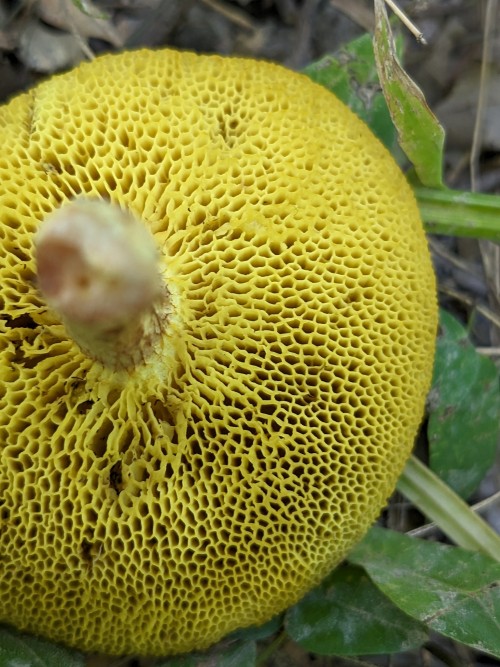
Some kind of bolete mushroom
Boletales
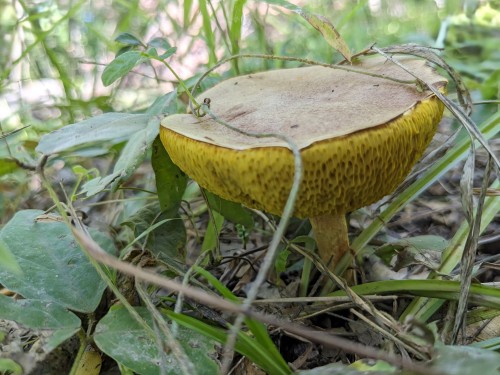
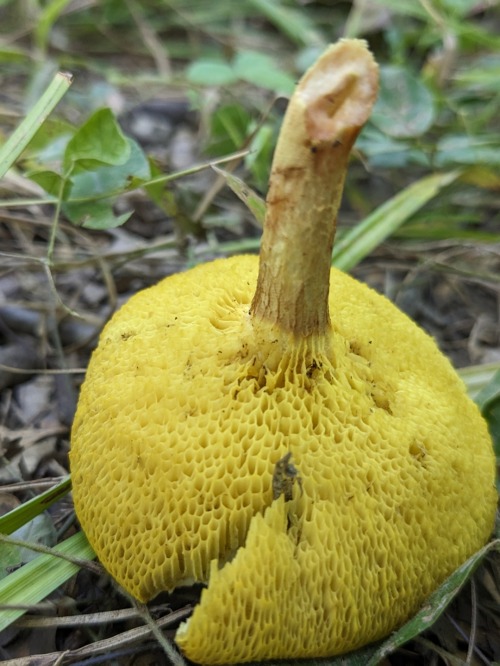
This bolete featured unusually large, bright yellow pores.
There are over 150 described bolete species in the Midwestern United States alone, so sometimes it's a challenge to narrow them down to an exact species ID. It's not an ash tree bolete. I found this one while doing field research in an old growth forest near the Meramec River near swamp white oak, pin oak, cottonwood, silver maple, green ash, persimmon, and hackberry trees. I'm not sure which tree it was associated with.
Aug. 18th, 2023
Arnold, Jefferson County, Missouri, USA
Olivia R. Myers
@oliviarosaline
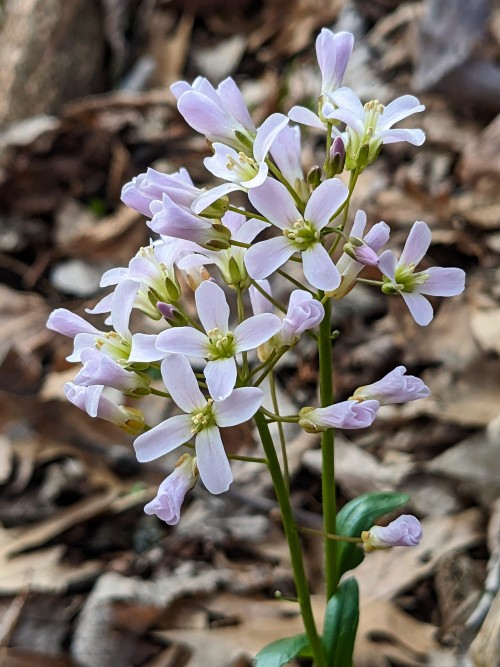

Purple Cress
Cardamine douglassii
Also known as Limestone Cress, this species in the mustard family features clusters of light purple flowers in early spring and can be found in wet and swampy forests with calcium carbonate rich soils. It's native to parts of the eastern United States and southern Ontario, Canada.
The plants I photographed are part of an isolated population remaining in a tiny bottomland forest remnant in St. Charles County, Missouri. Unfortunately, the rest of the forest has been lost due to suburban sprawl and what little of it remains has many invasive species, including winter creeper, callery pear, and japanese honeysuckle trying to encroach from surrounding developments and outcompete native plants like this one.
March 12th & 13th, 2024
St. Charles County, Missouri, USA
Olivia R. Myers
@oliviarosaline


Prairie Trillium
Trillium recurvatum
These unique, dark trillium plants caught our eye while we were exploring woods in Jersey County, Illinois. This species usually has splotchy green leaves. dailybotany suggested these trillium plants may have upped their anthocyanin production in response to exposure to higher levels of solar radiation. There were a few of these trilliums with dark leaves in the general area, and it may have been a sunnier than usual spot in the understory of the forest there, so this theory makes sense. I still wonder if it's possible this small population carries a genetic mutation... I have explored many woods and never seen trilliums this dark. I love listening to different theories and learning new info.
Trillium recurvatum is native to much of the Mississippi River basin in the central / eastern United States. Eastern Ohio has a few populations, which are listed as potentially threatened by their DNR. There are also a couple isolated populations in North Carolina, but it's debated whether or not they were actually planted long ago. Its closest lookalike with overlapping range is trillium sessile; however, the sepals on s. recurvatum plants curve downward as the flower opens, and the stem is usually much shorter than on t. sessile. This species can grow in habitats ranging from floodplains, to mesic forests and mesic savannas. Often, they're found growing in calcareous soils or over calcium-rich rocks such as limestone.
March 20th, 2024
Jersey County, Illinois, USA
Olivia R. Myers
@oliviarosaline
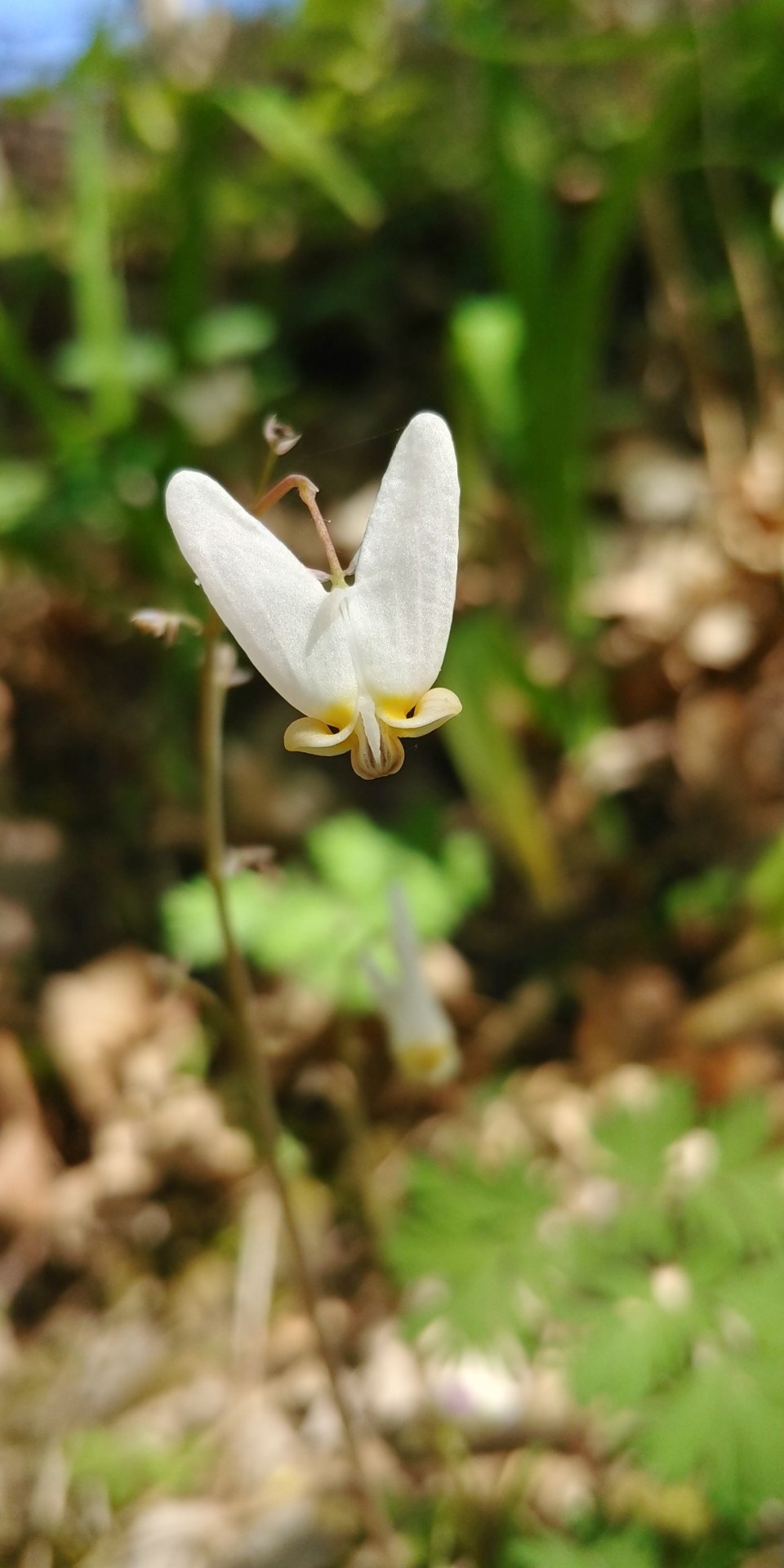
Dutchman's Breeches
Dicentra cucullaria
April 12th, 2023
St. Louis County, Missouri, USA
Olivia R. Myers
@oliviarosaline